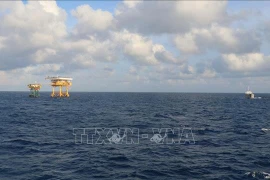At the 31st meeting of States Parties to theUNCLOS in New York in late June, head of the Vietnam Mission to the UNAmbassador Dang Dinh Quy stated that the East Sea is an important internationalsea route so that the maintenance of peace, security, stability, maritimesafety and freedom holds significance to peace and development in the regionand the world.
He reaffirmed Vietnam’s stance that every dispute must besettled via peaceful means on the basis of respect to international law,including the UN Charter and the 1982 UNCLOS, as well as diplomatic and legalprocesses, without the use of force or threat to use force.
To ensure the law-abiding principle in the East Sea in thecurrent context, parties concerned need to fully implement the Declaration onthe Conduct of Parties in the East Sea (DOC) and soon reach a practical andefficient Code of Conduct in the East Sea (COC) in accordance withinternational law, including the 1982 UNCLOS, he said.
In a statement on July 12, Japanese Foreign MinisterToshimitsu Motegi said the Permanent Court of Arbitration (PCA)’s ruling fiveyears ago is final andlegally binding for the parties to the dispute under the provisions of the UNCLOS.He expressed strong opposition to unilateral attempts to change the status quo inthe East Sea.
In a press statement on July 11, US Secretary of StateAntony Blinken rejected China’sexpansive maritime claims in the East Sea as having no basis ininternational law.
Theinternational community has long benefited from the rules-based maritime order,where international law, as reflected in the 1982 UNCLOS, sets out the legalframework for all activities in the oceans and seas, he stated.
The countryvoiced its support for lawful commerce, navigation and overflight rights, aswell as the sovereign rights and jurisdiction of coastal states in the waters,exercised in accordance with international law, including the UNCLOS, it said.
Malaysia’sTheinsnews.com on July 11 also ran an article saying that the 1982 UNCLOS is animportant legal instrument to define issues relating to sovereignty,territorial waters and rights and obligations of a maritime state. This is thelegal basis for coastal states to make maritime policies and developcorresponding legal documents.
In anarticle, Dr. Alexander Korolev and Dr. Irina StreInikova from Russia’sHigher School of Economics wrote that the PCA’s ruling became an importantmilestone in the history of territorial disputes in the East Sea, andinternational law plays the supreme role in resolving these disputes.
During thefourth workshop held by the Asia - Africa Institute at the Hamburg Universityof Germany in early July, Prof. Thomas Engelbert from the HamburgUniversity noted that the international community has stressed the importanceof complying with international law while strongly protesting against theinfringements of the UNCLOS as well as the refusal to adhere to the PCA ruling.
Prof. SuzetteSuarez from the Bremen University of Applied Sciences described the PCA rulingas a legal document with high international value and an important role inresolving disputes and demarcating the outer limits of the continental shelf inthe East Sea, which is a binding and compulsory procedure under UNCLOS.
Based on international law and the PCAverdict, China’s “nine-dash line” claim and other claims of sovereignty in theEast Sea are completely void, she said./.





























